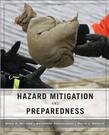危险化解与防备 Hazard Mitigation and Preparedness
2006-10
John Wiley & Sons Inc
Schwab, Anna J./ Eschelbach, Katherine/ Brower, David J.
568
Where do you want to go? You might already be working in the emergency management field, and may be looking to expand your skills. You might be setting out on a new career path. Or, you might want to learn more about exciting opportunities in emergency management. Wherever you want to go, Hazard Mitigation and Preparedness will help you get there. Easy-to-read, practical, and up-to-date, this text not only helps you learn fundamental hazard mitigation concepts, it also helps you master the core competencies and skills you need to succeed in the classroom and beyond. The book’s brief, modular format and variety of built-in learning resources enable you to learn at your own pace and focus your studies.作者简介: Anna K. Schwab is in the Department of City and Regional Planning at the University of North Carolina, Chapel Hill.
1 Hazards vs. Disasters Introduction 1.1 Hazards: Part of the Natural Environment 1.1.1 Natural Hazards Are Inevitable and Unstoppable 1.1.2 The Earth's Dynamic Equilibrium 1.1.3 Types of Natural Hazards 1.1.4 Are Natural Hazards Becoming More Frequent? 1.1.5 Man-Made Hazards Self-Check 1.2 Hazards and Disasters: Not the Same 1.2.1 The Official Definition of Disaster 1.2.2 The Intersection of the Human Environment and a Natural Hazard 1.2.3 Why Are There More and Bigger Natural Disasters? Self-Check 1.3 The Many Costs of Disasters 1.3.1 Direct Financial Costs 1.3.2 Long-Term Economic Costs 1.3.3 Environmental Costs 1.3.4 Societal Costs 1.3.5 Human Lives Lost 1.3.6 Top Ten Natural Disasters in the United States Self-Check 1.4 Mitigation and Preparedness for Resilient Communities 1.4.1 Taking Action to Prevent Disasters 1.4.2 The Emergency Management System 1.4.3 Preparedness 1.4.4 Mitigation 1.4.5 The Difference between Preparedness and Mitigation Self-Check 1.5 Mitigation Strategies 1.5.1 A Mitigation Toolbox 1.5.2 Strategies to Mitigate Man-Made Hazards 1.5.3 Risk Assessment and Mapping 1.5.4 Managing Community Growth and Development 1.5.5 Protecting the Environment 1.5.6 Tying It All Together with Mitigation Planning Self-Check 1.6 The Value of Mitigation and Preparedness 1.6.1 Mitigation Contributes to Sustainable Communities 1.6.2 Mitigation Pays 1.6.3 Mitigation Calls for Environmental Integrity 1.6.4 Window of Opportunity 1.6.5 There's More to Be Done Self-Check Summary Key Terms Summary Questions Review Questions Applying This Chapter You Try It2 Meteorological and Hydrological Hazards Introduction 2.1 Weather-Related Natural Hazards Self-Check 2.2 Hurricanes 2.2.1 Hurricane Formation 2.2.2 Hurricane Characteristics 2.2.3 Measuring a Hurricane: The Saffir-Simpson Scale 2.2.4 Landfall 2.2.5 Patterns of Hurricane Activity 2.2.6 Explaining the Increase 2.2.7 Patterns of Human Activity 2.2.8 2005: A Record-Breaking Season 2.2.9 What's In a Name? Self-Check 2.3 Flooding 2.3.1 Floodplains, River Basins, and Watersheds 2.3.2 Types of Flooding 2.3.3 Flash Flooding 2.3.4 General Flooding 2.3.5 Flood Mapping 2.3.6 Low-Level Flood Risks Self-Check ……3 Geological Hazards 4 Man-Made Hazards 5 Hazards Management Framework 6 The Role of the Federal Government 7 Mitigation Hazards at the State Level 8 Local Government Power 9 Community Resilience and the Private Sector 10 Risk Assessment 11 Preparedness Activities 12 Hazard Mitigation Tools and Techniques 13 Hazard Mitigation Planning 14 Building a Culture of Prevention Endnotes Glossary Index

危险化解与防备 Hazard Mitigation and Preparedness PDF格式下载